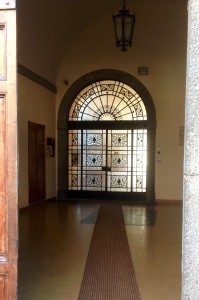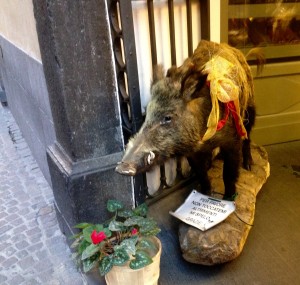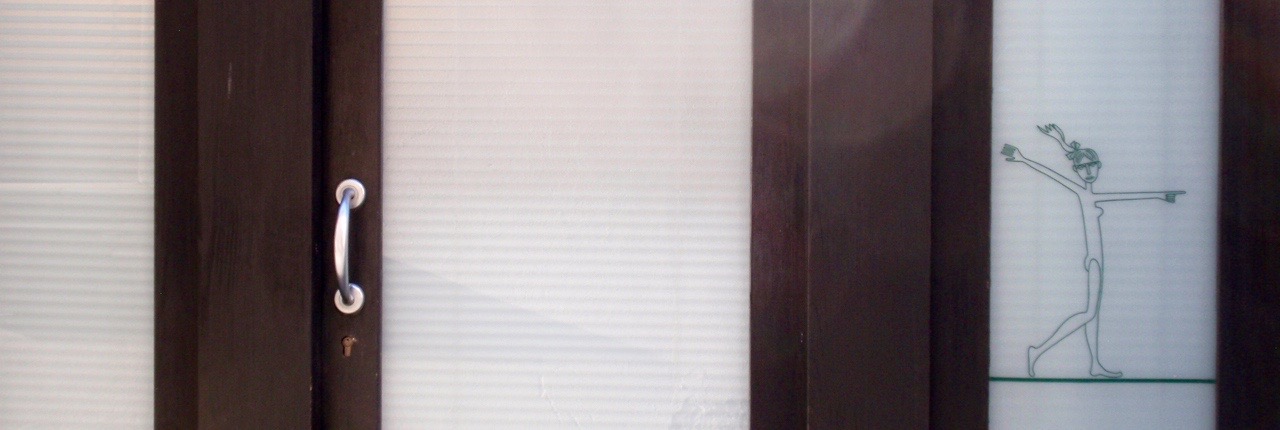I ran into a friend just now I’ve not seen in eight years. We are both grayer, him a bit, me a lot. Otherwise, we seemed younger than we were eight years ago. He’s divorced now and comes up from Lecce in the south almost every weekend to stay with his mother and visit his daughter. He conducts research on ecological matters regarding marine biology.
About ten years ago he accompanied a group of students to New York City and asked me if I could set up an theatre experience for them, something out of the ordinary. I had a friend in a chase-around production of A Midsummer Night’s Dream that was being performed in Central Park, it was free, it was fun, so we arranged to meet near Strawberry Fields. Somehow, I explained to the students, in Italian, what was about to happen and how to participate. The production was great. They loved it. They got to meet some actors afterward.
 Today, after the first few astonished words of reconnection, the next thing my friend said was how that experience in the Park had opened new doors for him, was a turning point. He talked about Shakespeare, and theatrical format, and the students’ appreciation, but I felt there was something more, something he’d not the words to express – or that it was a flood not yet forded.
Today, after the first few astonished words of reconnection, the next thing my friend said was how that experience in the Park had opened new doors for him, was a turning point. He talked about Shakespeare, and theatrical format, and the students’ appreciation, but I felt there was something more, something he’d not the words to express – or that it was a flood not yet forded.
We went for coffee. I asked if he’d been back to New York since we’d met there, years ago. No, he said, but he’d returned to the States three times. Miami twice and Baltimore for five days. Baltimore? “Ever heard of Chesapeake blue crab?” Vaguely. “Well, it’s become an invasive species in the Mediterranean, so we’re studying it, trying to find out how to deal with it.” What have you come up with? “That it’s delicious and we should eat it.” I laughed. “You make fun, but seriously, it’s the best way to manage them. They’re huge. Our native crab are small and can’t compete. Our Italian and Greek crabbers who work so hard catching these small creatures, would make more money, and more easily, catching the big guys. Whole new systems of transport, processing, distribution would be created, and in the meantime, we’d give our native species a chance at survival. We can’t get rid of the blue crab, but we can adapt.”
I laughed again. Not because what he said was funny, but because the idea was elegant.
“We’ve gone to Brussels with this, but they’re having a hard time grasping it. They’re used to programs, to policies that can be put in place to eliminate (or make them feel they’ve eliminated) a problem. So, management is puzzling to them. And it’s way too cheap for their habit. If they can’t dream up programs that cost a fortune, they don’t feel they’ve done their job. But all we have to do is teach the crabbers to use traps instead of nets, and help advertise this new type of crab as a culinary sensation, and the rest takes care of itself. The guys in Brussels will get it eventually.”
I giggled again, again because of elegance.
I ask him how he travels for his weekends in Orvieto. He says he likes most to travel by train, but occasionally he flies. “It takes about the same time, either way, and in a train you can sit and read and work the whole way instead of catching local transit, standing in line, and constantly dealing with logistics. And when I have to fly, it means leaving the house at 3:30 in the morning.”
Eager to seem that I understand the wee hours, I offered that I sometimes wake at 3:30 and spend a couple of hours meditating and reading. That it’s a pleasant hour of morning.
“Sure great for that, but try leaving the house. It’s a bit different.”
Not wanting to appear the wimp I am, I said what a good idea! I’ll take a walk next time that happens.
“You’ll see fox and wild boar.”
Well, I’ll stay in the city.
“In the city. That’s what I mean. I saw a rather large pig and her six little ones in  Piazza Cahen a couple of weeks ago.” and he shows me what it was like displaying his cautious harmlessness to the alarmed mom of six. “They come up looking for garbage to eat. That’s probably because they’re not real Italians. The Umbrian boar were over-hunted, so much larger ones were brought in from Central Europe. They fell in love with the few Umbrians that remained, and now we have medium-sized pigs who are more successful then either and must be hunted or we’ll have to start keeping them as pets.”
Piazza Cahen a couple of weeks ago.” and he shows me what it was like displaying his cautious harmlessness to the alarmed mom of six. “They come up looking for garbage to eat. That’s probably because they’re not real Italians. The Umbrian boar were over-hunted, so much larger ones were brought in from Central Europe. They fell in love with the few Umbrians that remained, and now we have medium-sized pigs who are more successful then either and must be hunted or we’ll have to start keeping them as pets.”
I stated my preference for pets without tusks.
“I wake up sometimes thinking about all this, all the things I study, then about climate change which overshadows everything and makes it all seem hopeless. And I breathe, go about my work, and realize again that we can’t stop what we’ve started. But we can adapt. And we need to adapt quickly, and that includes changing the way we think. The reason we’re in this mess is because we believe we can control things and we can’t, but we can work with them, and we can do that very successfully.”
His last words echoed over millennia, and the echo validates beyond my meager agreement.
We exchanged contact info in the magic, electronic way people do now. We will walk, “have coffee” or dine one of these weekends. He seemed happy to have run into me. I am, too. So good to know people whose lives have followed completely different paths. Trading notes on the journey is what humans have always done. Accompanied by good humor, enthusiasm, courage, and hope, it is among the best of pastimes.
New doors were opened for me, too (beyond the prospect of encountering wild boar in Piazza Cahen) but I don’t quite have the words to describe them – I have yet to ford the flood.
